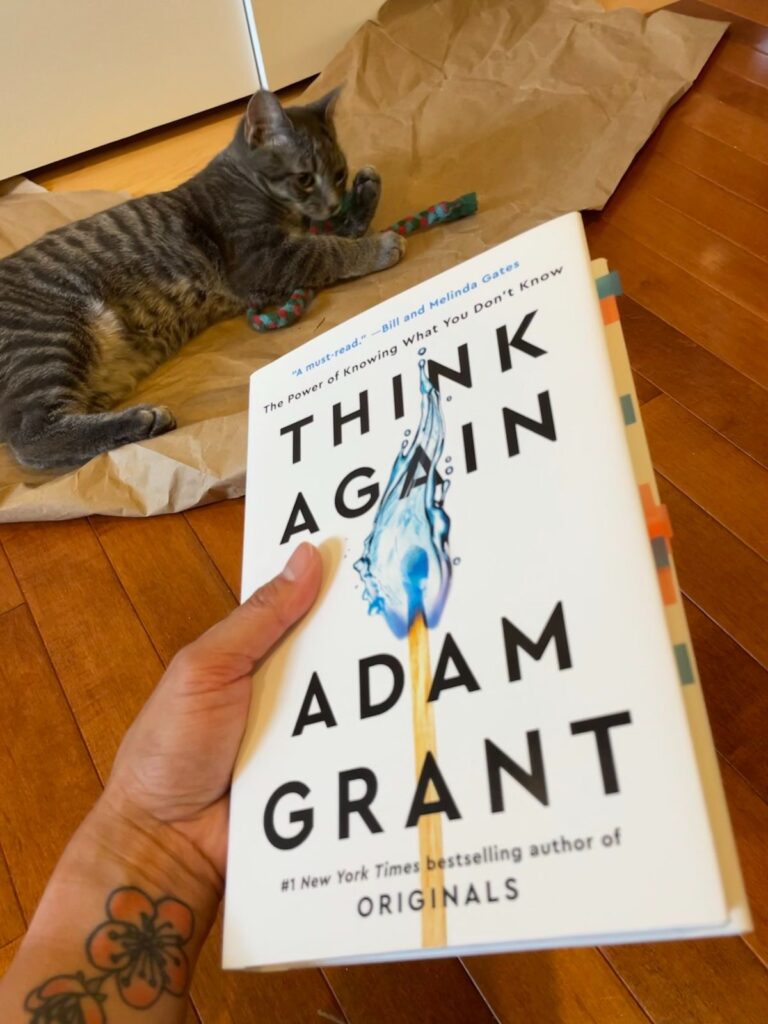
Over the weekend, I read a book that I’m really excited to share with you and recommend that you read. Normally, the non-just-for-fun books I read have some interesting snippets at best, or are just cover some generally interesting topic. It’s rare to find a book that not only teaches me something new, but does it in a way that gives me actionable steps to put my fresh knowledge into practice. Think Again (by Adam Grant) does that, and on a topic that is near and dear to my heart: understanding and being able to talk about complex, contentious topics. You can get a copy here (affiliate link), but if my bare say-so isn’t enough (and really, it shouldn’t be), let me tell you more about why I say so.
Social media isn’t the only place where we struggle with difficult conversations these days, though it’s perhaps one of the worst because typed words and one-way media make it difficult to have nuanced exchanges with individuals. More, it’s easy to surround ourselves only with people we get along with and, let’s be honest, only who we generally agree with. For that matter, it’s undeniably healthy for our minds and hearts to avoid the kinds of nasty conflicts and protracted arguments that can be a “feature” of our online lives if we don’t curate our experiences. If we are what we eat, constantly exposing ourselves to problematic content can turn us into the kinds of people we don’t want to be, thinking things we wouldn’t normally think.
Going too far in the direction of unfollowing people we don’t like and putting our heads in the sand when it comes to ideas we don’t like with isn’t so good either, though. Part of it is because that causes us to dehumanize “those other folks.” When we cut them off from our lives, it makes it difficult for us to remember that they are actual human beings and that we probably actually have quite a bit in common with them. “They,” like us, have families and friends and animal friends who they care deeply about. They have hobbies and interests that they are passionate about, just like us – sometimes even the same ones. They live in our communities, and they work in our workplaces, go to our schools, shop and eat where we do. We lose that connection, and become more alone.
Worse, our ways of thinking and the ideas that we know become calcified because they are no longer challenged. We believe we are right because there is nobody to tell us we are wrong. There is nobody to tell us we are wrong because we’ve constructed our worlds to avoid them. And with nobody tell us we are wrong, there is nobody to tell us that perhaps the facts have changed, perhaps there’s an angle we haven’t considered yet, perhaps the state of the art or the leading edge of science have moved on without us. While it’s natural to prefer thinking that our knowledge is secure, that attitude is exactly what causes us to miss the nuances that show the weaknesses and edges in our understanding. It’s also what makes it impossible for us to reach across the aisle to help others get where we’re coming from and why we think what we do, not to mention the opposite and helping us get what it is that drives the people who are living around us.
Think Again is about identifying those areas that we need to, well, rethink. It’s about becoming comfortable with not knowing and even seeking out those places where we might find out that what we know isn’t so much mistaken as entirely wrong. It’s about learning to enjoy, even celebrate, finding out that we need to throw out our old ideas and bring in new ones. It’s about reminding us of the joy of discovery over the joy of argument and the joy of smug correctness. And then it teaches us how to inject those processes and attitudes into our relationships and our communities. In the end, it results in allowing us to live more confidently, more truly in line with our core values, and more at peace with ourselves and other people. And I don’t know about you, but I like the idea of being able to continue changing and growing because my life is being enriched by new viewpoints. Even if I don’t agree with everything I learn, I’m better off for knowing those ideas are out there, and I think you would be too.
It’s a quick read, and I hope you’ll give it a try too. Remember to bring an open mind, and come back here to tell me what you think of it.




